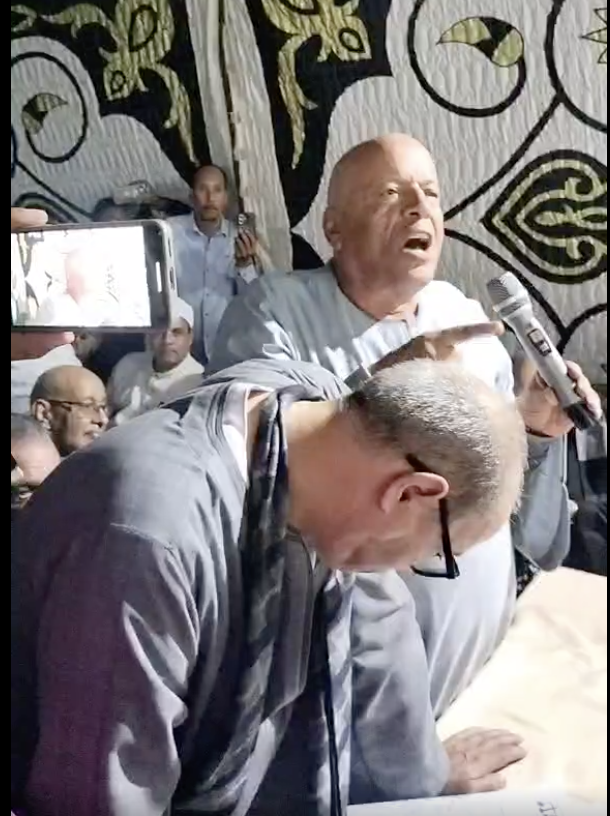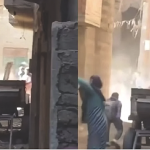By Coptic Solidarity –
A wave of sectarian violence erupted in the village of Nazlet Gelf, Beni Mazar, Minya Governorate, after rumors circulated about a relationship between an 18-year-old Christian young man and a Muslim girl. This rumor quickly escalated into mob violence, followed by the imposition of a customary reconciliation session, which resulted in massive fines, forced displacement, and no accountability for the attackers.
Customary Session and Its Controversial Rulings
Instead of prosecuting the attackers, a customary reconciliation session (جلسة عرفية) was held, attended by village elders, local officials, representatives of both families, and hundreds of villagers. This session produced decisions widely seen as unjust, coercive, and illegal under Egypt’s constitution. The main decisions of the session were:
- A fine of EGP 1 million on the young man’s grandfather, Napoleon.
- A commitment by the father, Samih Ishaq, to sell his home and leave the village with his family.
- A penalty clause of EGP 2 million on either side if the agreement is violated.
- Legal prosecution of the detained young man will continue.
- A complete ban on posting about the incident on social media.
- Oversight of the agreement assigned to the village mayor, Mahmoud.
Although the official speaker after the session did not mention displacement, a local Coptic representative—under pressure—publicly declared that both Samih Ishaq and his father Napoleon must sell their homes and leave the village permanently. The announcement was met with applause, “Allahu Akbar” chants, and ululations from villagers.

Coptic witnesses reported that the family accepted the terms only under extreme fear. Homes belonging to many Coptic families, as well as to both Napoleon and the boy’s uncle, Atif Samir, had been attacked after Friday prayers. Fire was thrown at the houses, though no casualties occurred because the entire extended family had already fled the village.
The main targeted homes are:
- Napoleon’s three-story house, where he and his wife (both elderly) live.
- Samih Ishaq’s three-story house, where he lives with his wife and three children.
These customary rulings raise serious concerns:
- On what legal– or even traditional– basis can families be fined or displaced over an alleged relationship by an individual?
- Why are victims (Coptic families) punished, while attackers face no consequences?
- Why is “collective punishment” normalized, even though it violates the Egyptian Constitution and international law?
- Why does the State tolerate such sessions instead of upholding the rule of law?
Observers note that this reflects a broader pattern in Minya: authorities often resort to customary sessions instead of criminal justice, especially when sectarian violence involves Copts. This enables impunity, fuels future aggression, and undermines citizen trust in the State.
Mob Violence Before the “Reconciliation”
Angry crowds gathered in the village, attacking multiple Coptic homes—including families completely unrelated to the young man. Houses were pelted with stones, doors and windows were smashed, and agricultural land owned by Christians was set on fire.
Eyewitnesses reported panic among residents, especially women and children. Viral videos showed:
- The first shows a man shouting threats and vulgar insults at Coptic residents, vowing to burn the church and drive Christians out of the village, using vulgar language and incitement.
- The second shows a frightened young girl saying, “Mama, I’m scared.” Her mother tries to reassure her, but moments later, the mob attacks their home with stones — intensifying the terror.

Security forces eventually arrived and made arrests, but state authorities issued no official statements about the violence, arrests, or charges. Members of Parliament remained silent.
Conclusion
The Nazlet Gelf case highlights a disturbing reality:
- Victims were terrorized, their homes destroyed, and their land burned.
- Yet they, not the attackers, were fined, silenced, and expelled.
- No government institution has spoken. No MP has protested. No justice has been served.
This incident is not an isolated case — it is a symptom of systemic failure, where customary law overrides constitutional law, and the price is always paid by the weakest and most vulnerable.





